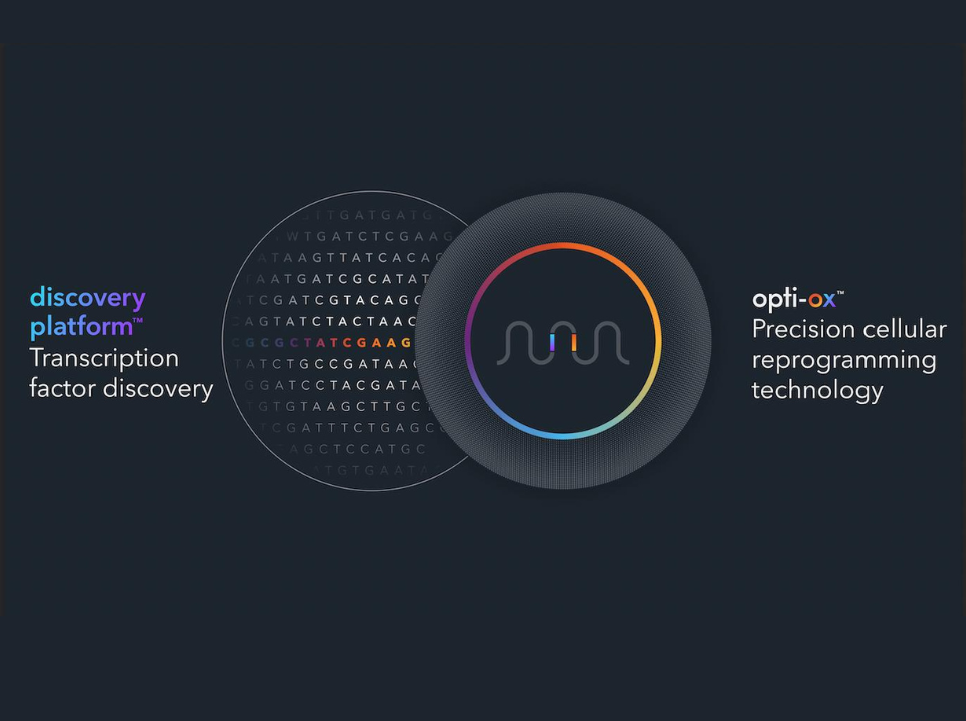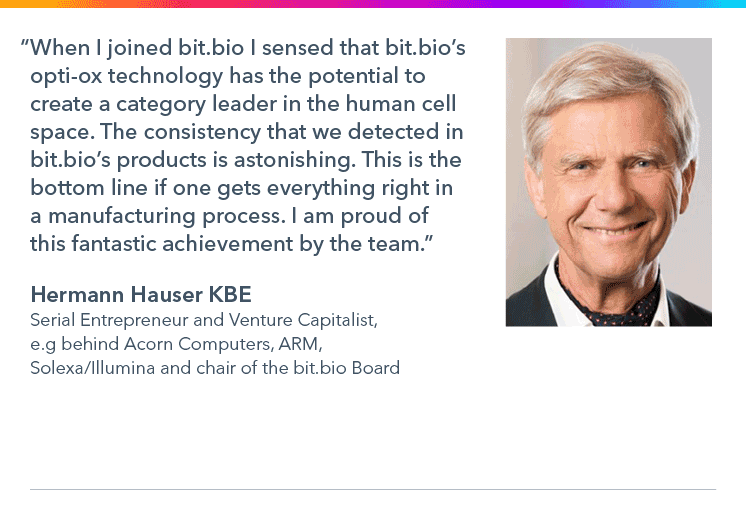15.06.2023 | Published by bit.bio

- Data presented at the International Society for Stem Cell Research (ISSCR) conference shows unparalleled level of consistency across manufacturing of multiple human cell products
- World leading stem cell biologists call the technology “a watershed moment for biology” and “a true disruptive innovation in stem cell biology, much as CRISPR has been for genetics”
- bit.bio’s ioCellsTM are already being used and enable large-scale experiments that underpin preclinical research and drug development
- The consistency of the cells is enabling scientific breakthroughs and applications ranging from biohybrid devices, novel targets for neurodegeneration, and cultured meat.
BOSTON, US 00:01, CAMBRIDGE, UK 05:01, 15 June 2023: bit.bio, a synthetic biology company focused on human cells, has achieved a milestone in the manufacture of human cells. Based on their opti-oxTM 1 - based transcription factor reprogramming technology, bit.bio has reached a new level of precision and consistency of their induced pluripotent stem cells (iPSC)-derived cell products.
 The data presented at the ISSCR conference show an unparalleled level of consistency with regards to multiple human cell products for research use. Samples of cells were sequenced from independent opti-ox reprogrammed manufacturing lots for multiple cell types. Analysis of the samples show fewer than 1% differentially expressed genes in bulk-mRNA sequencing experiments between manufacturing lots. This achievement sets a new standard for the manufacture of human cells.
The data presented at the ISSCR conference show an unparalleled level of consistency with regards to multiple human cell products for research use. Samples of cells were sequenced from independent opti-ox reprogrammed manufacturing lots for multiple cell types. Analysis of the samples show fewer than 1% differentially expressed genes in bulk-mRNA sequencing experiments between manufacturing lots. This achievement sets a new standard for the manufacture of human cells.
“Out of 20,000 genes, not a single one is differentially expressed across three independently produced batches of bit.bio’s glutamatergic neurons. This seems like a watershed moment for biology. The team at bit.bio has achieved a level of consistency that is outside of the realm of what was thought possible. It is another proof point that transcription-factor based programming of cells can solve the challenges that have restricted the use of stem cell-derived cells in drug development and cell therapy.”
 Marius WernigProfessor at Stanford University and bit.bio SAB member
Marius WernigProfessor at Stanford University and bit.bio SAB member
The consistency and scale of manufacturing achieved, with billions of cells now being produced on a daily basis, has opened doors to the creation of human cell standards. This has the potential to address the lack of reproducibility that has plagued the life sciences industry. By using reliable and standardised human cells, researchers worldwide can accelerate their studies and enhance the reliability of their findings.
“These new results are both compelling and biologically fascinating. bit.bio's opti-ox approach seems to remove interfering sources of stochasticity, thereby enabling deterministic reprogramming of iPSCs into somatic cells of any lineage. The homogeneity achieved by opti-ox is amazing, and I would never have thought such a high level of control over differentiation was possible. This is a true disruptive innovation in stem cell biology, much as CRISPR has been for genetics.”
 Roger PedersenHuman stem cell pioneer, Senior Research Scientist at Stanford University School of Medicine and chair of bit.bio’s SAB
Roger PedersenHuman stem cell pioneer, Senior Research Scientist at Stanford University School of Medicine and chair of bit.bio’s SAB
Cells produced using the opti-ox technology have already been used in a range of research applications, including the identification of novel targets for neurodegenerative diseases such as Alzheimer’s2,3. They have been used for the generation of biohybrid implant devices aiming to restore paralysed limb function4, and 3D printing of brain models5.
The ability to produce cells at an industrial scale allows large-scale experimentation, such as high-throughput screening - for example, underpinning bit.bio’s partnership with leading contract research organisation Charles River Laboratories. This means scientists can now conduct experiments on a significantly larger scale in human models, leading to faster discoveries and a deeper understanding of cellular mechanisms.
In addition, bit.bio is developing their technology for use in the field of cell therapy. Large scale manufacturing of human cells based on the ability to precisely reprogram iPSC into specific somatic cell types will enable off the shelf regenerative medicines that are available to millions of patients as mainstay treatments.
"A scalable source of consistent human cells will have a transformational impact on research, drug discovery, and cell therapy. It can tackle major challenges such as the reproducibility of scientific research all the way to scale up challenges for cell therapies and regenerative medicine. bit.bio's preclinical data show extraordinary consistency. The fact that this has been achieved across multiple cell types is also astonishing. bit.bio’s genomic safe harbour technology, opti-ox, is really pushing the boundaries."
 Loïc VincentCSO Affini-T Therapeutics
Loïc VincentCSO Affini-T Therapeutics
Outside of medicine, the extraordinary scale enabled by opti-ox has enabled the manufacture of trillions of fat and muscle cells in a porcine background for cultured meat applications. Meatable held their first tasting in Singapore this year6 and is due to launch its first products by the end of the year.
"Meatable is creating a world in which we can enjoy meat that is innocent. At the heart of our approach and enabling this dream is opti-ox. It allows us to manufacture at scale, and in the future reach price parity with meat derived from farmed animals. Whilst it is surprising to see these levels of consistency in the data, it is also what we experience on a daily basis. We found that opti-ox enables the manufacture of cells at all levels of scale, from the smallest experiment to the largest industrial bioreactor."
 Krijn de NoodMeatable co-founder and CEO
Krijn de NoodMeatable co-founder and CEO
bit.bio's human cell manufacturing technology is set to reshape the future of scientific research and biomedicine. By ensuring reliability, scalability, and reproducibility, bit.bio is driving forward the frontiers of cellular biology and transforming the possibilities of what can be achieved.
"The beauty of the data and how consistently bit.bio can produce human cells using our forward programming technology is mind-boggling. The team has developed solid processes and we haven’t had a single failed manufacturing run in the past two years. This is paving the way for groundbreaking research and future cell-based therapies. We are excited to collaborate with researchers and industry partners to unlock the full potential of human cells."
 Mark KotterCo-founder and CEO, bit.bio
Mark KotterCo-founder and CEO, bit.bio
Data for multiple cell types - ioGlutamatergic Neurons, ioSensory Neurons and ioGABAergic Neurons - will be presented at ISSCR, showing the approach may be generalisable to any human cell type.
About the data
This new data will be showcased in 4 posters and a talk at ISSCR. For early access to the posters, a pack of the data and the recording of the talk, please fill out this form.
Innovation Showcase
Thursday, 15 June 12:00 – 1:00 pm ET at ISSCR.
Title: ‘Industrialising Cellular Reprogramming: Leveraging opti-ox Technology to Manufacture Human Cells with Unprecedented Consistency’
Speakers: Marius Wernig and Mark Kotter
Posters:
- Generation Of Highly Pure, Consistent And Functional Inhibitory Gabaergic Neurons From Human Ipscs Using opti-ox Technology
Presenter Gianmarco Mastrogiovanni, Team leader - Optimised and scalable reprogramming of human iPSCs to generate nociceptor sensory neurons for the study of pain mechanisms and neuropoathies
- Modelling neurodegeneration using a human isogenic system: A next generation approach to study frontotemporal dementia and amyotrophic lateral sclerosis
Presenter Will Bernard, Director, Cell Type Development - Rapid and consistent generation of functional microglia from reprogrammed hiPSCs to study mechanisms in neurodegeneration and neuroinflammation
Presenter Malathi Raman Srivastava, Senior Product Manager
Learn more here.
References:
- Matthias Pawlowski, Daniel Ortmann, Alessandro Bertero, Joana M. Tavares, Roger A. Pedersen, Ludovic Vallier, Mark R.N. Kotter 2017. Inducible and Deterministic Forward Programming of Human Pluripotent Stem Cells into Neurons, Skeletal Myocytes, and Oligodendrocytes, Stem Cell Reports, VOLUME 8, ISSUE 4, P803-812, APRIL 11, 2017. https://www.cell.com/stem-cell-reports/issue?pii=S2213-6711(16)X0005-7
- Julie Qiaojin Lin, Deepak Khuperkar, Sofia Pavlou, Stanislaw Makarchuk, Nikolaos Patikas, Flora CY Lee, Julia M Zbiegly, Jianning Kang, Sarah F Field, David MD Bailey, Joshua L Freeman, Jernej Ule, Emmanouil Metzakopian, Marc-David Ruepp, Giovanna R Mallucci 2023. HNRNPH1 regulates the neuroprotective cold-shock protein RBM3 expression through poison exon exclusion, The EMBO Journal, 30 May 2023. https://www.embopress.org/doi/full/10.15252/embj.2022113168
- Pavlou, S., Foskolou, S., Patikas, N. et al 2023. CRISPR-Cas9 genetic screen leads to the discovery of L-Moses, a KAT2B inhibitor that attenuates Tunicamycin-mediated neuronal cell death. Nature Scientific Reports 13, 3934 2023. https://www.nature.com/articles/s41598-023-31141-6
- Amy E. Rochford, Alejandro Carnicer-Lombarte, Malak Kawan, Amy Jin, Sam Hilton, Vincenzo F. Curto, Alexandra L. Rutz, Thomas Moreau, Mark R.N. Kotter, George G. Malliaras and Damiano G Barone 2023. Functional neurological restoration of amputated peripheral nerve using biohybrid regenerative bioelectronics, Science Advances, 22 Mar 2023, Vol 9, Issue 12, https://www.science.org/doi/10.1126/sciadv.add8162#
- Zhou, L., Wolfes, A.C., Li, Y., Chan, D.C., Ko, H., Szele, F.G. and Bayley, H., 2020. Lipid‐bilayer‐supported 3D printing of human cerebral cortex cells reveals developmental interactions. Advanced Materials, 32(31), p.2002183. https://onlinelibrary.wiley.com/doi/10.1002/adma.202002183
- Press release, 11 May, 2023: Meatable holds its world-first tasting in Singapore with aim to launch in 2024. https://meatable.com/news-room/